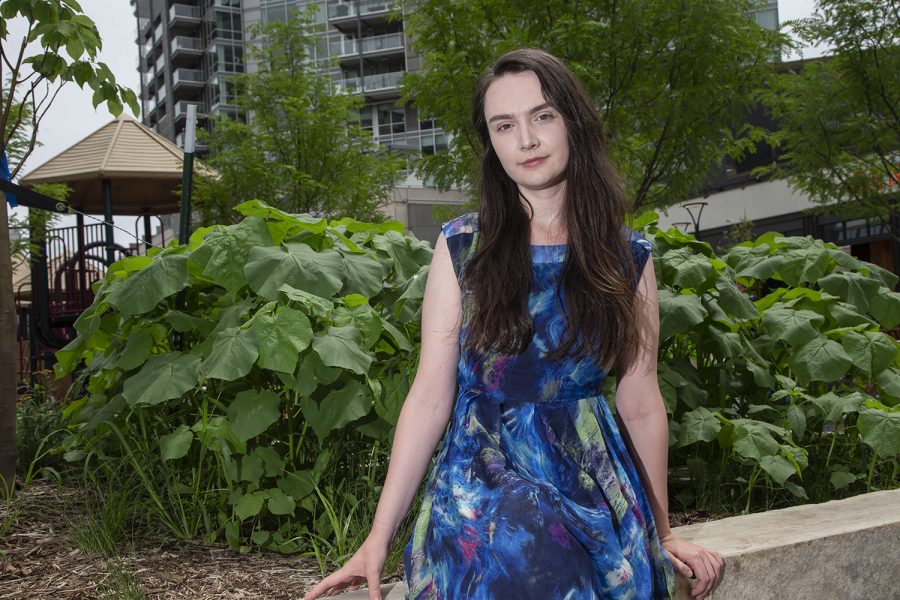UI student hopes to bring papermaking to Cambodia’s cultural renaissance
UI student Isabella Myers, with a Fulbright grant, will travel to Cambodia to study and re-create century-old manuscripts.
Isabella Myers poses for a portrait outside the Iowa City Public Library on June 23, 2019. (Katie Goodale/The Daily Iowan)
June 25, 2019
Making paper from scratch is a long, arduous process; each sheet takes around a full day to complete. It starts with a bunch of harvested plant fibers and an entire day’s worth of work. It’s as much an art as it is a utility.
In Cambodia, it’s nearly a lost art. With the support of a Fulbright grant, UI student Isabella Myers wants to preserve it.
She will work in a temple in Cambodia’s Kampong Cham province, where the last of the 16th-century Buddhist manuscripts, called kraing, sit. Myers said the manuscripts were written by monks for funerary rites and rewritten over and over because the paper eventually degraded in the humid climate.
It will be a tall order, because the infrastructure to preserve aging manuscripts does not exist in Cambodia as it does in Japan or China. Left unprotected, the manuscripts are at risk of being unusable. The kraing are written in Pali, a language that the monks spoke but not the language of the village they’re located near. It would be as if the Bible was never translated from Latin to the common languages, Myers said.
“It’s about 30 hours of travel time,” she said. “I don’t think it gets much farther than that.”
Myers will learn from the manuscripts as well as other local sources about what purpose the texts served and how they were created to make her own paper and books modeled after them for exhibition.
While Iowa City is known for its dedication to the written word, Myers said, the programs dedicated to the paper they’re printed on is the best in the country and pivotal in her trajectory towards Cambodia. She said she was interested in printing going to college at the Chicago Art Institute, but when she transferred to UI and was introduced to the Center for the Book, she found a new passion.
Myers said she owes a great deal to the director of the UI Center for the Book, Professor Timothy Barrett. Barrett is otherwise known as “El Maestro” to people in the papermaking industry, including Alberto Valenzuela of the Papel Oaxaca studio in San Agustín Etla, Mexico.
Barrett is a Fulbright winner himself, and he spent two years in Japan studying papermaking under a Fulbright.
“I couldn’t believe someone was paying me to investigate this subject I was so interested in,” Barrett said.
Once the plants for papermaking are harvested, they are stripped down to the fibers and soaked to soften. For papyrus, the fibers are sliced into thin strips and placed in water. For a fig or mulberry tree, the bark is stripped off and soaked for 12 hours with constant stirring. Once wet, the fibers are shaped into a rectangle and pounded together.
Myers said the papermaking community spans continents, from the U.S. to Mexico to Japan and China. She said that when she traveled to San Agustín Etla, a small mountain town with no internet but with a handful of people who make paper, they learned about Barrett from Japanese papermakers who had traveled there as well. And Myers wants to help bring Cambodia to the table.
“Part of [Fulbright] is to create diverse and dynamic networks across the globe, to share knowledge across communities, and improve lives around the world,” said Karen Wachsmuth, the UI associate director of international fellowships.
After the fibers are pressed together and soaked, they’re laid out in the sun to dry. Once dry, the fibers are paper and ready to use until they degrade in the environment, and the cycle starts again.
Myers said she was content with being a semifinalist in the Fulbright program, and she expected Cambodia to prefer researchers and fellows in STEM fields and public health rather than the humanities.
“If you have the right idea for the right country at the right time with enough curiosity and the right background, you can get one of these things,” Barrett said.
When Myers was notified of her win in April, she almost missed it entirely; the email went to her personal email instead of her school email. She was emphatically reminded by Associate Professor Sara Langworthy, her departmental adviser, to check all of her emails.
“It still hasn’t hit me that it’s real,” Myers said. “But it will soon.”




